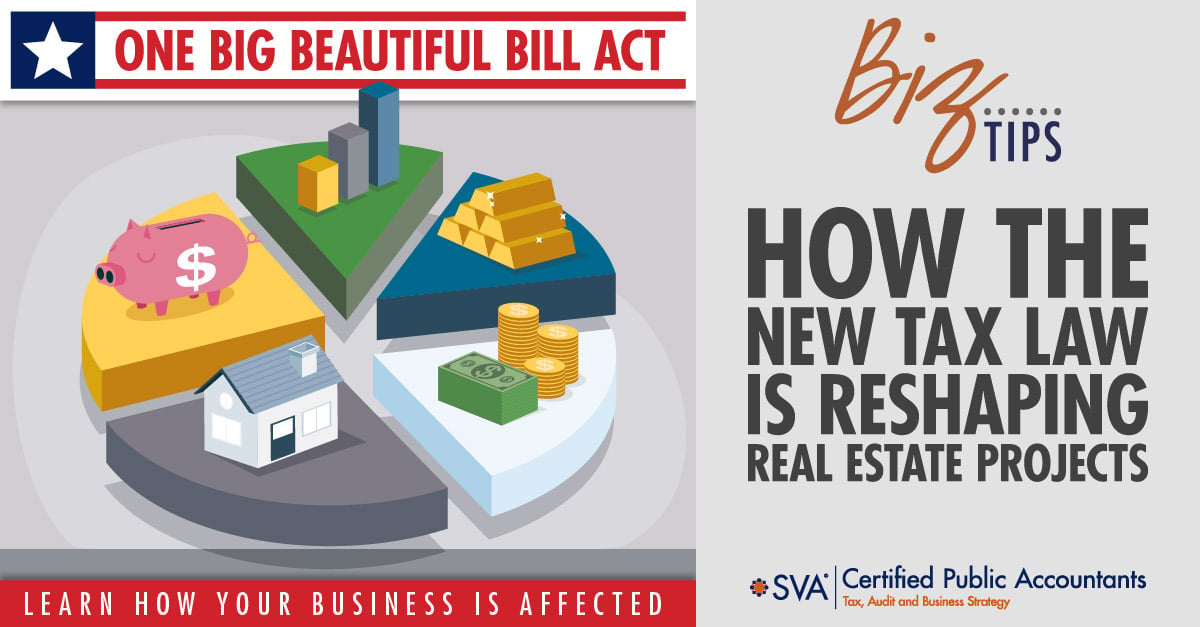| Highlights: |
- Summarizes how the One Big Beautiful Bill Act permanently changes key tax provisions like QBI deduction, bonus depreciation, and Opportunity Zone rules affecting real estate development and investment.
- Explains specific impacts for developers and investors including affordable housing incentives (expanded LIHTC), interest deductibility, and project cost recovery strategies.
- Notes certain energy-efficiency tax breaks are phasing out and encourages reevaluating project planning and financing to align with the updated tax code.
|
The One Big Beautiful Bill Act (OBBBA) introduces a number of tax updates, especially for the real estate sector.
From boosting long-term incentives to accelerating cost recovery, the bill is packed with provisions that can significantly impact developers, investors, and property owners.
(Download Video Transcript)
6 Areas Where New Legislation and Real Estate Intersect
Here are six key areas where the new legislation intersects with real estate:
1. QBI Deduction Becomes Permanent
Real estate professionals operating pass-through entities like LLCs, partnerships, or S corporations will benefit from the now-permanent 20% Qualified Business Income (QBI) deduction. This effectively lowers the top tax rate on eligible income from 37% to 29.6%.
Additionally, a new floor has been introduced: small business owners with just $1,000 in QBI are guaranteed a $400 deduction. This is particularly helpful for those earning REIT dividends or partnership income and adds a layer of predictability for tax planning.
2. 100% Bonus Depreciation Returns for Good
Starting in 2025, qualified property placed in service can once again be fully depreciated in the first year. This 100% bonus depreciation is now a permanent fixture, allowing developers to immediately deduct the cost of eligible improvements like HVAC systems, lighting, and appliances.
A notable addition: certain manufacturing buildings now qualify, creating new opportunities for developers focused on industrial or production-based projects.
3. Opportunity Zones Made Permanent
Originally created in 2017, the Opportunity Zone (OZ) program has been made permanent and modernized. States can designate new OZs every decade, allowing the program to evolve with changing demographics and investment trends.
The core benefits remain: defer capital gains for five years, receive a 10% step-up in basis, and pay no tax on appreciation if the investment is held for 10 years, subject to certain limitations. Rural zones now get an added boost with lower development thresholds and a higher (30%) basis step-up after five years.
4. Affordable Housing Incentives Get a Boost
The Low-Income Housing Tax Credit (LIHTC) is a key financing tool for affordable housing, and it's been significantly expanded. States will receive 12% more in annual allocations, and the tax-exempt bond requirement has been cut in half, from 50% to 25% of eligible project costs.
This change makes it easier for developers to close financing gaps, particularly for projects aimed at addressing housing shortages in both urban and suburban markets.
5. More Room to Deduct Business Interest
The cap on business interest deductions is now based on EBITDA (earnings before interest, taxes, depreciation, and amortization), rather than EBIT. This provides more leeway for highly leveraged real estate projects to deduct interest expenses.
It also brings back key tax planning decisions. Real estate businesses may still elect out of these limitations, but doing so affects depreciation methods, making it critical to evaluate your hold period and financing structure before making a move.
(Download Video Transcript)
6. Energy Efficiency Tax Breaks Are Phasing Out
Not all tax updates are here to stay. Some energy-related incentives are on the clock, including:
| Section 45L |
Homebuilders have until June 30, 2026, to claim up to $5,000 per unit for energy-efficient residential properties. |
| Section 179D |
This commercial deduction for installing energy-saving upgrades like lighting and insulation also phases out for buildings that begin construction after June 30, 2026. |
What Should Developers Do Next?
These tax changes present a mix of permanent advantages and short-term opportunities. Now’s the time to:
- Re-evaluate your capital projects for bonus depreciation or energy credits
- Consider how Opportunity Zones or LIHTC expansions could fit into your investment strategy
- Review your financing to take advantage of favorable interest deduction rules
While the landscape is shifting, there’s also a new level of clarity. That makes this an ideal moment to partner with tax and financial advisors to align your projects with the updated code and maximize the return on your next development.
© 2025 SVA Certified Public Accountants

